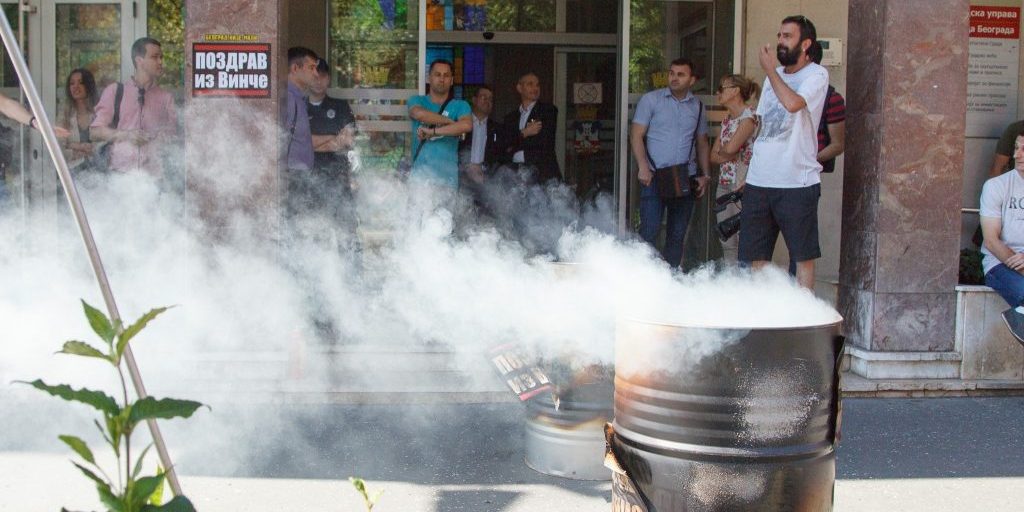EU bank drops Belgrade incinerator, citing impact on recycling: EBRD and other banks press on
Prague, Belgrade – The European Investment Bank (EIB) has refrained from financing the planned Vinča municipal waste incinerator in Belgrade, Serbia, according to a letter sent to the Ne Davimo Beograd initiative that campaigns against the project.
28 October 2019

Protest in front of the city administration
The EIB said that both its appraisal and an opinion from the European Commission on the project found that the incinerator would prevent Serbia from achieving its environmental targets on recycling and the circular economy as part of the EU accession process.
In contrast, the European Bank for Reconstruction and Development (EBRD), the International Finance Corporation (IFC) and the Austrian Development Bank (OeEB) have recently signed loans for the project (3).
Ne Davimo Beograd and Bankwatch have recently filed an official complaint (4) to the EBRD about the Vinca project. The groups claim that the bank breached its own policies by failing to avoid negative environmental impacts from the project. This could have been achieved by supporting more sustainable practices like waste prevention, re-use, composting and recycling, which are at an extremely low level in Belgrade.
The complaint also highlights the fact that incinerators tend to crowd out waste prevention and recycling measures due to lengthy contracts that require city authorities to deliver consistent amounts of waste. In the groups’ view, the EBRD did not adequately respond to the concerns raised on this issue.
Pippa Gallop from CEE Bankwatch Network said, “The EBRD and IFC have persistently claimed that the incinerator would not affect recycling, without providing any evidence. Now the EIB and Commission say the opposite. The EBRD and IFC have a lot of explaining to do.”
Aleksa Petković from Ne Davimo Beograd said, “We welcome the EIB and the Commission’s recognition that Belgrade should not be prioritising incineration. We are already suffering from low recycling levels and dire air quality. The last thing we need is another source of pollution and another diversion from setting up a functional recycling system. The EBRD, IFC and OeEB need to withdraw from this project while they still can.”
Contacts:
Aleksa Petković
Ne Davimo Beograd
Email: nedavimobeograd@gmail.com
Tel: +381(0)11 420 85 96
Pippa Gallop
CEE Bankwatch Network
E-mail: pippa.gallop@bankwatch.org
Skype: pippa.gallop
Tel: +385 99 755 9787
Notes for editors:
- For more information about the project, see: https://bankwatch.org/project/belgrade-incinerator-public-private-partnership-ppp-belgrade-serbia
-
For more information see: https://nedavimobeograd.rs/english/
-
In addition to the planned incinerator, the project would include the construction of a new landfill, a landfill gas plant, a construction waste depot and a cosmetic rehabilitation of the existing Vinca waste landfill, but no recycling or composting of municipal waste. The EBRD is contributing a EUR 128.5 million syndicated loan, including a loan of EUR 72.25 million from its own account, a loan of EUR 35 million provided by Erste Group Bank AG, and EUR 21 million in concessional finance funded by TaiwanICDF. The International Finance Corporation (IFC) and Oesterreichische Entwicklungsbank (OeEB) are lending up to EUR 72.25 million and EUR 35 million, respectively. Source: https://www.ebrd.com/news/2019/belgrade-to-get-new-waste-management-facilities.htm
-
See complaint, here: www.ebrd.com/documents/occo/belgrade-solid-waste-ppp-complaint.pdf?blobnocache=true
Never miss an update
We expose the risks of international public finance and bring critical updates from the ground – straight to your inbox.
Institution: EBRD | IFC | EIB
Theme: Waste incineration
Location: Serbia |
Project: Belgrade incinerator PPP
Tags: waste incineration
